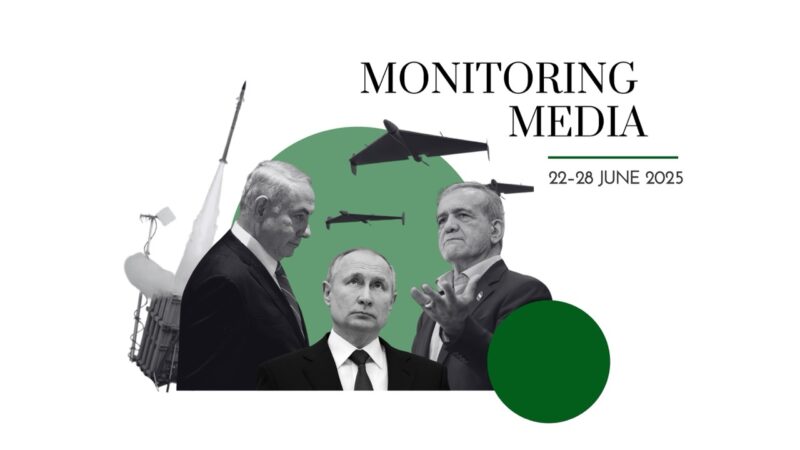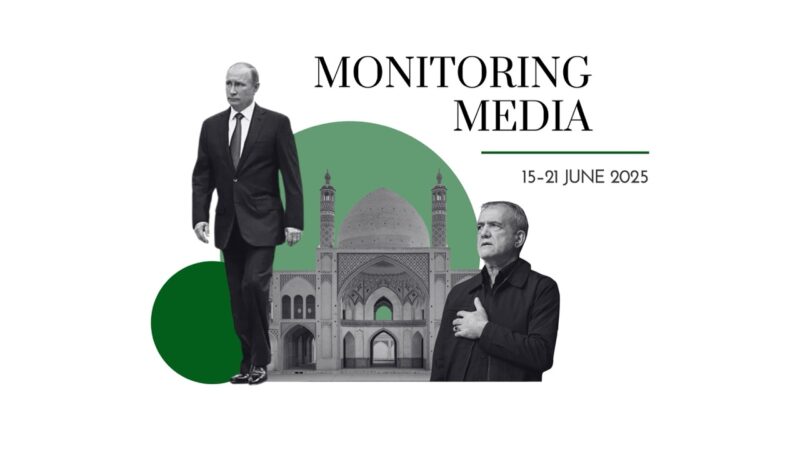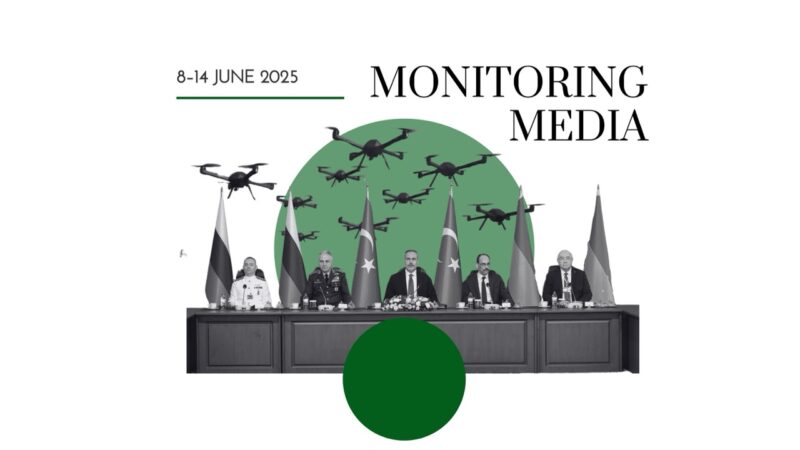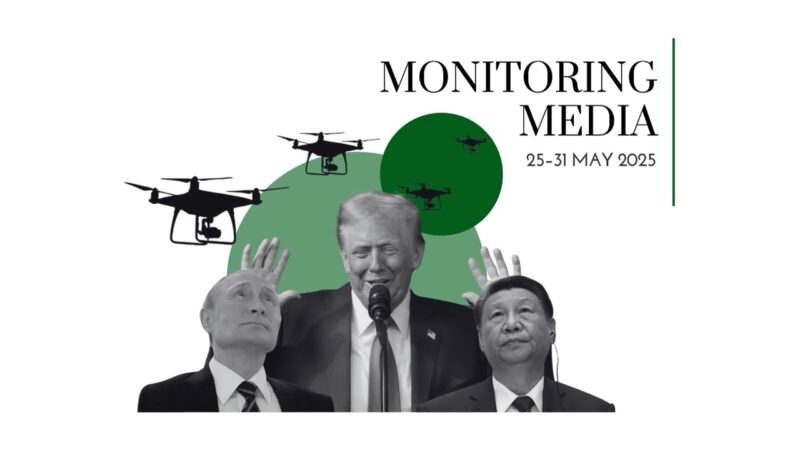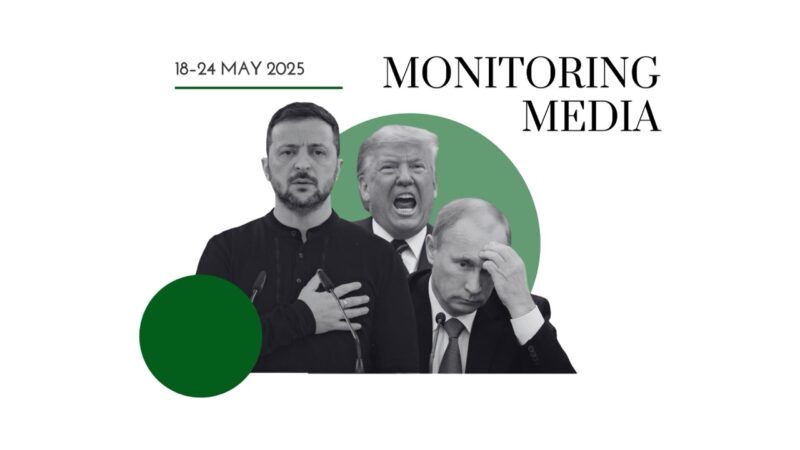Russo-Ukrainian war has turned into a world war

CIUS weekly report on North American media coverage of Ukrainian affairs, 3–9 November 2024
Two publications (The National Interest, Foreign Affairs) were selected to prepare this report on how Ukraine has been portrayed in the North American press during the past week. The sample was compiled based on their impact on public opinion as well as on their professional reputation, popularity among the readership, and topical relevance. These publications represent centrist viewpoints on the political spectrum.
This MMS report covers only the most-read and relevant articles about Ukraine, as ranked by the respective North American publications themselves in the past week. Its scope covers promoted articles on home pages and articles from special sections on Ukraine, with the hashtag #Ukraine, from the paper editions of the publications, and about Ukraine from opinion columns and editorials.
Featured topics
- The world and Ukraine: How the Russo-Ukrainian war could go nuclear; Russo-Ukrainian war has turned into a world war.
- Russia at war: North Korea joins Russia’s war against Ukraine; Risks of North Korea joining Russia’s war against Ukraine.
MMS summaries
North Korea joins Russia’s war against Ukraine. Bruce E. Bechtol (National Interest) warns that North Korea’s decision to send 12,000 soldiers could have a significant impact on the course of the war and on the further deepening of ties between Pyongyang and Moscow. North Korea has been supplying Russia with artillery shells, ballistic missiles, and small arms for almost two years. Pyongyang told Moscow of its offer to send 100,000 troops in 2022, but only now has Russia given the green light. The first contingent of troops consists of “four brigades, about 3,200 men each, that are subordinate to North Korea’s 11th Corps, which some experienced analysts may remember as the ‘Light Infantry Training Guidance Bureau.’ North Korea’s light infantry troops are among the best trained, best fed, and most motivated of the country’s troops.” According to the author, this is a symbolic step that “shows solidarity in both rhetoric and action.” However, it is unlikely to change the situation on the battlefield. While Moscow received qualified special forces to strengthen its elite forces, Pyongyang got much more than that. It gained the ability to more actively spread its military power: “That brings in money, oil, foodstuffs, and technical/weapons systems updates and support for North Korea’s very large but largely antiquated military.” According to Bechtol, “The more troops North Korea sends to fight the war in Ukraine, the more money it makes for the regime. Pyongyang has never had a better deal.”
Risks of North Korea joining Russia’s war against Ukraine. Mark N. Katz (National Interest) argues that Moscow and Pyongyang will not necessarily benefit from the deployment of North Korean troops to Russia. The benefits of this decision for the two autocracies are obvious: Moscow gains manpower, allowing it to redeploy its troops to liberate the Ukrainian-occupied Kursk region, and Pyongyang gains critical currency and technology. It is also a symbolic step intended to undermine Ukraine’s desire to defend itself against Russian aggression. However, in the author’s opinion, such a step by two non-democratic regimes may contain significant risks to themselves. First, North Korean troops could create more problems than they solve: “It may be that North Korean troops prove to be more trouble than they are worth if they do not fight effectively and coordination between them and Russian ones proves problematic, as some Russian troops have already acknowledged.” Second, it could prompt South Korea and other Western countries to increase their aid to Ukraine: “Seoul has already raised the prospect of responding to the deployment of North Korean troops to Russia by providing South Korean arms to Ukraine.” Third, Pyongyang could lose its most capable forces: “Acquiring battlefield experience for possible use against South Korea, after all, is only useful if North Korean soldiers survive fighting against Ukraine.” Fourth, the invitation of North Korean troops to Russia to fight against Ukraine creates conditions for Kyiv to invite Western troops: “Even if most, or even all, NATO governments might not want to do this officially, ‘volunteers’ from various NATO countries might arrive in increased numbers.” Fifth, Moscow’s image deteriorates even further: “Moscow’s dependence on Iran for armed drones and ballistic missiles as well as North Korea for artillery shells and now soldiers hardly enhances Russia’s image as a great power.” According to Katz, “The arrival of North Korean troops in Ukraine does not bode well either for Ukraine or for its Western backers. But it might not work out all that well for Russia or North Korea either.”
How the Russo-Ukrainian war could go nuclear. William M. Moon (Foreign Affairs) emphasizes that Russia’s war against Ukraine could go nuclear at any time, due to the dangerously close location of Russian nuclear weapons to the front line. A nuclear-weapon state bears full responsibility for the safety of its warheads. However, “since Russia invaded Ukraine in February 2022, it has put approximately 30 percent of its estimated 5,580 warheads in an untenably precarious position.” While at the beginning of the full-scale invasion, the biggest concern was Russia’s occupation of Ukrainian nuclear power plants, now it is the nuclear warheads that Moscow keeps on its western borders. Ukraine has every right to defend itself by striking deep into Russia. Regardless, Moscow bears full responsibility for the safety of its warheads and must withdraw them from the contact line: “After Ukraine launched its first drone and missile attacks against Belgorod in the spring of 2023, Russia quickly reported that its Belgorod storage site was no longer storing nuclear warheads—acknowledging that warheads should not be stored anywhere near active fighting. But remarkably, there have been no Russian announcements about the status of the warheads it has at any of its other storage sites.” In the author’s opinion, there are several reasons for Moscow’s lack of reaction: “Russian President Vladimir Putin may believe that moving Russian nuclear warheads would be a sign of weakness; senior Russian leaders may not recognize the dangers posed to these warheads; or the Russian military may fear that the West would misconstrue moving warheads as preparations for a nuclear attack, prompting a preemptive strike by NATO.” According to Moon, “The world must convince Russia that it is fundamentally endangering its reputation as a responsible nuclear power: its management of its nuclear arsenal over the past two and a half years clearly violates the basic responsibilities expected of nuclear states.”
Russo-Ukrainian war has turned into a world war. Michael Kimmage and Hanna Notte (Foreign Affairs) argue that new actors in the Russo-Ukrainian war are transforming it and complicating the path to its end. Russia’s full-scale invasion of Ukraine in 2022 was a global event that affected the entire world: “Millions of refugees fled Ukraine into the rest of Europe. Fuel and fertilizer prices shot up, stimulating inflation worldwide. The war disrupted the production and distribution of grain, generating concerns about supply far afield from Russia and Ukraine.” Most of the states that decided not to support Ukraine in its resistance to Russian aggression hesitated between two options: “not to provide Kyiv with weapons or to sanction Russia.” Others tried to benefit from Russia’s loss of markets in Europe and the US, or “offered themselves as mediators in the sincere (or insincere) hope of minimizing the war’s direct and ancillary costs or even of ending it altogether.” According to the authors, the longer the war lasts, the more non-European countries are drawn into it: “Some are giving Russia the means to prolong the war—men and munitions. By using Ukraine as a testing ground, they hope that they will be better prepared for wars they themselves may fight in the future.” North Korea’s decision to send troops to Russia is the latest example. Other non-Western states are trying to shape the course of the war or “positioning themselves to be present at the creation of a postwar Europe—that is, to be at the table for the negotiations that will end the conflict, however distant that prospect may be.” According to Kimmage and Notte, “Amid this terrible war, non-European states are turning Europe into an object of their foreign policy… Europe, having projected its power outward for centuries, is becoming a theater for the projection of non-European power.”
